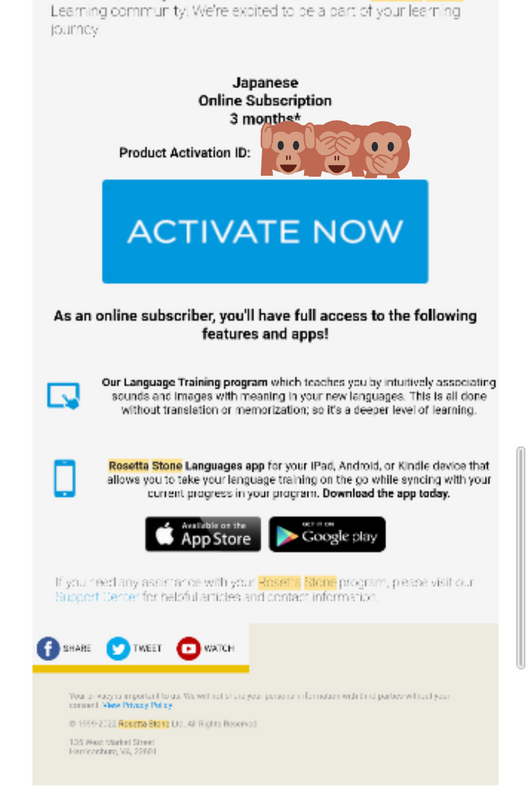Jan 28, 2022
Rosetta Stone App: Not for Intermediates, Only Beginners
For most foreigners living and working in Japan, speaking Japanese is usually at least a little important for daily life. Most of us accrue sets of daily use phrases over the course, of time even if we stepped off the plane with no understanding of the language whatsoever. One problem I have encountered within myself is a distinct lack of momentum in my studying practices regarding Japanese. Since I studied the language in college, I had a basic working knowledge when I arrived, but have only managed to add a little vocabulary and a couple of grammar points to that in all these years.
Improving my Japanese level would be beneficial at work as I could better explain finer grammar points to kids who aren't getting it in English and have more consistent conversations with clients. With this in mind, I chose to make use of a discount for a three month subscription to Rosetta Stone's app with the hopes that the language company's methods would help me gamify the process and get me back into studying regularly.

If you're in a similar situation, do something else. Unless you really don't even have a basic working vocabulary in Japanese, Rosetta Stone's app will not be helpful.
The first time I opened the app, I made the mistake of starting at the first lesson, which was painfully slow. Then I started jumping to the reviews at the end of the units. There I found issues with their vocabulary and conversation practice as it would sound if someone actually used those words in Japan.
First, the vocabulary has clearly not been updated in a bit. The pictures for the units have but not the words themselves. This is a problem because words like sumaho (smart phone) exist and can be super confusing when you've only been taught keitai (cell phone) which isn't really in popular use anymore. The same goes for the word for computer, which Rosetta Stone insists is the same katakana abomination as my college Japanese textbook. The word conputaa was wrong when I read it twenty years ago and has not become more correct since then. There are several words for computer in modern popular use but none of them are conputaa. A PC in the desktop variety is likely a pasacon. A laptop may be a notopasacon or nopa or some other shortened version that Japan accepts as normal, but none of them are conputaa.
Then the conversations as laid out in the app were uncomfortable. From an introduction in which someone responds to douzo yoroshiku with sayonara to a wedding announcement that has the recipient of the news asking full length questions as if grilling the bride-to-be like a criminal suspect, the words just didn't work. Hot tip: If someone says douzo yoroshiku, you say it back unless you said it first. If someone knows you well enough to tell you about their wedding, "honto ni?" is enough to convey surprise and must be followed immediately with "omedeto gozaimasu." Extending every English "wow!" to a Japanese "Honto desu ka?" results in unnatural and potentially offensive Japanese.
I admit there is only so much one can do with any app. The goal is to get people used to a handful of vocab and conversation options. Still, this tool should be updated to include more normal and natural language. Also, their reading/listening section was completely in romanji, which isn't going to help people who actually want to read the language.
If you actually study with this tool, follow it up with some real, native language. Watch some anime or dramas, even if you have to do it with English subtitles, because you need to hear what the language actually sounds like.



2 Comments
helloalissa
on Jan 31
I did a check through of Duolingo's Japanese course several years back and it was just okay... not bad for beginners and free. I agree, at your level, authentic materials that you're interested in would be the best. Manga? My reading speed and vocab has gone up since I started in on a series. Best part is it's fun. I was able to learn grammatical vocab by listening to Japanese teachers explain it, which is super helpful to know. Unfortunately I don't know of any good dramas or manga that can help with that.
kuroneko
on Feb 6
Hello, I just wrote my first blog on here talking about my struggles with the language. I never tried Rosetta Stone but I believe it was a fever from the 90's built on massive marketing, lacking some urgent update. I did try Duolingo for a while as I mentioned in my post but I could only go so far. The suggestion for finding some drama of your interest that keeps your attention while dumping the language on you, as the other commenter suggested sounds like the best option to me. I like to watch that series Midnight Diner and have been watching another drama lately with over 50 chapters but they use a very old school Japanese which doesn't help me much. Thanks for the heads up on RS.